April 2022
New publications: Policy Briefs | Routledge and Oxford Handbooks | Comparative Reports and Insights | Global Extremes Blog Articles | Country Reports
Upcoming events: Conferences in Morocco and Belgium
Workshop archive: Bulgaria, Malaysia, Morocco, UK
Learning: Online Courses Extended
GREASE Films: Festival Inclusion

As this newsletter is being written, war is raging in Ukraine. Russia’s invasion of its neighbor has shocked the world and cast a dark shadow over Europe. While Ukraine is not among the countries covered by the GREASE project, Russia is. Fortunately, we were able to complete our field work in Russia before cross-border scientific exchange with the EU was disrupted. Our Russia Country Report and (shorter) Country Profile highlight the role the Russian Orthodox Church plays in Moscow’s foreign and domestic policy.
State-church relations is just one of three overarching topics being explored by the GREASE project. The others are governance of religious diversity and religiously motivated violent radicalization. Aspects of each are explored in the many publications, films, educational activities, and workshops highlighted in this newsletter.
With most face-to-face gatherings cancelled at the height of the pandemic, we secured a half-year extension for our project in hope of reviving in-person events once restrictions eased. That hope is now being fulfilled: We are thrilled to announce plans for two in-person conferences during our final six-months. We look forward to connecting with you (also virtually) at our final conference in Brussels in September.
Policy Briefs
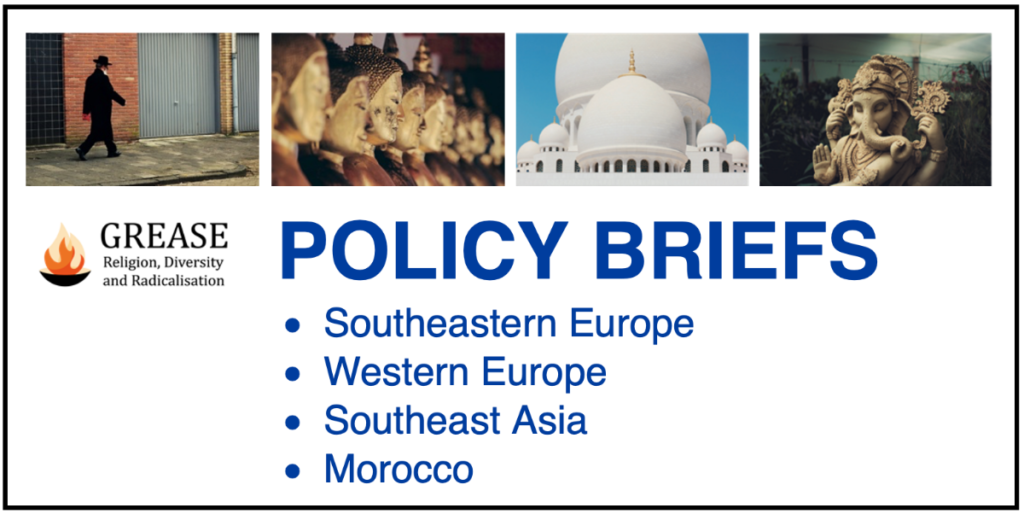
Managing religious diversity and preventing violent radicalisation are major policy challenges. Conceived with these challenges in mind, the GREASE project has been producing relevant evidence and analysis of a high scholarly standard that can also be used to inform policymaking.
Working in different world regions, we posed a common set of questions:
– How do different configurations of state-religion relations affect social cohesion and inclusion?
– How can religiously motivated (or attributed) violent radicalisation be countered effectively while upholding fundamental rights?
– What impact are current counter-radicalisation policies having?
Though such questions cannot be thoroughly addressed by any single research project, our investigation has yielded valuable insights. You will find our main policy-relevant findings expressed in a set of Policy Briefs which are now being published.
Our first policy brief – focusing on Southeastern Europe – has just been made available on the GREASE website. The remaining briefs will follow individually at weekly intervals until the set is complete in mid May. Each offers concrete policy recommendations, in many cases aimed at specific institutional bodies in the relevant countries.
- Preventing Religiously Motivated Radicalisation: Lessons from Southeastern Europe
- The Power of Positive Connections: Western European Approaches to State-Religion Relations and Radicalisation
- Managing Religious Diversity and Radicalisation in Malaysia and Indonesia
- Preventing Religiously Inspired Violent Radicalisation Among Moroccan Youth: Barriers and Opportunities
Routledge and Oxford Handbooks
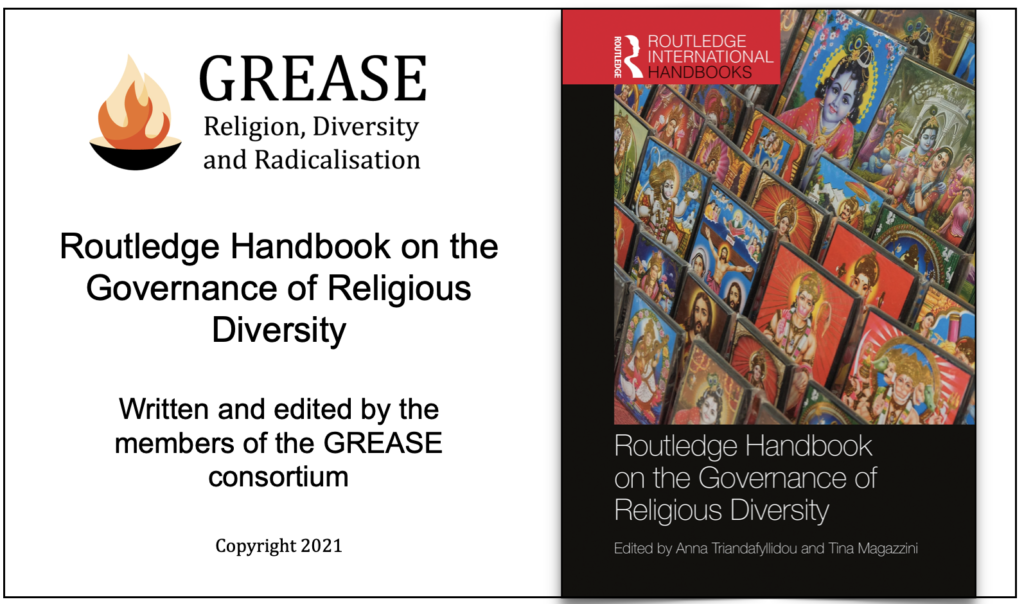
Written and edited by members of the GREASE consortium, The Routledge Handbook on the Governance of Religious Diversity critically reviews state-religion models and illuminates different responses to the challenges encountered in accommodating both majorities and minorities. Assessing current practices, norms, and institutions, the book offers an overview of how different states have historically navigated the entanglements between national and religious identities.
Our first full-length book (previewed in our previous newsletter) has now been published. It examines how religious diversity is managed, governed, and accommodated in a broad range of settings. Written and edited by the members of the GREASE consortium, The Routledge Handbook on the Governance of Religious Diversity critically reviews state-religion models and illuminates different responses to the challenges encountered in accommodating both majorities and minorities. Assessing current practices, norms, and institutions, the book offers an overview of how different states have historically navigated the entanglements between national and religious identities.
The Routledge Handbook on the Governance of Religious Diversity is available for purchase from the publisher and Amazon as hardback and e-book.
In his assessment of the volume for the Journal of Ethnic and Racial Studies, Pier-Luc Dupont describes it as “singularly ambitious … a useful resource for scholars with an interest in links between Islam, Christianity, nationalism and human rights”. Writing for the journal Nationalism and Ethnic Politics, Dimitra Mareta finds “significant information and insights” in the book, considering it “a vital contribution to this field”.
Watch a video interview about the book with its co-editorsAnna Triandafyllidou and Tina Magazzini.
Meanwhile, the contents of another handbook – The Oxford Handbook of Religion and Europe – have also benefited from the expertise of the GREASE project. Consortium members. Thomas Sealy, Tina Magazzini, Tariq Modood and Anna Triandafyllidou co-authored the Oxford handbook’s key chapter “Managing Religious Diversity in Europe”.
Comparative Reports and Insights
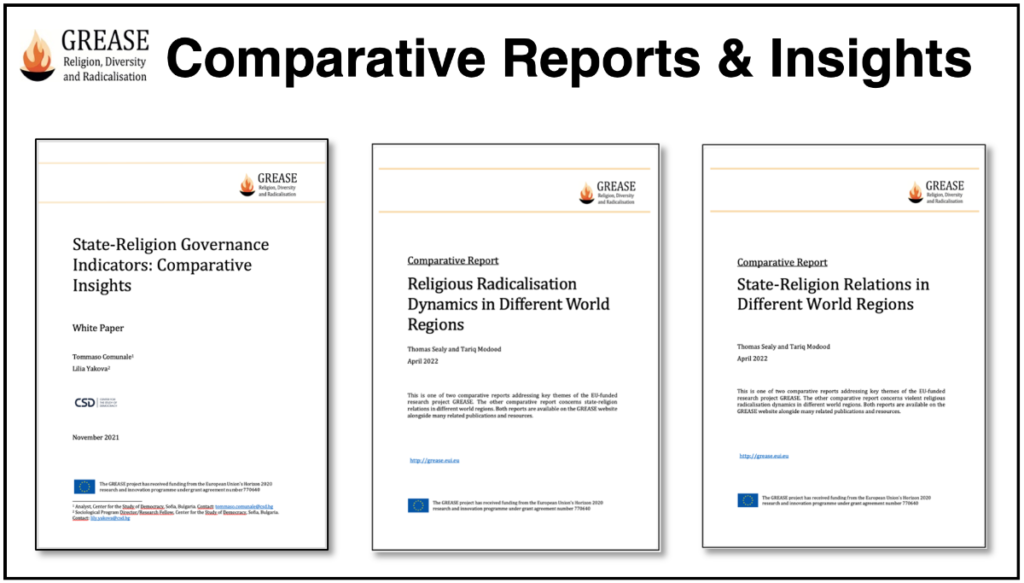
We have just released a pair of comparative reports looking at state-religion relations and violent religious radicalisation in different world regions. The reports pull together the results of research conducted by our consortium partners in over 20 countries covering Europe, the MENA region, Asia and Australia. Addressing two crucial dimensions of the GREASE project, our comparative reports consider institutions, norms, policies and practices in regions with diverse historical experiences and cultural traditions.
We have also produced a Comparative Insights white paper to accompany our State-Religion Governance Indicators. Written by our team at CSD who spearheaded the GREASE indicators initiative, the paper outlines the methodology used to create these indicators and offers comparative insights into the country assessments produced using our indicators toolkit.
New Country Reports

When the GREASE project started, our plan was to investigate 23 countries around the globe, which seemed ambitious enough. But now we have exceeded that goal, covering 25 countries, including one in a world region (North America) beyond our purview. That’s thanks to the work of two dedicated scholars from outside the project who expressed an interest in contributing to the GREASE knowledge base.
Guided by the members of our consortium, our esteemed collaborators have produced country reports on Canada and Bangladesh. In the case of Canada, we are happy to note that this collaboration resulted also in a GREASE Indicators Assessment report.
Upcoming Events: Conferences in Morocco and Belgium
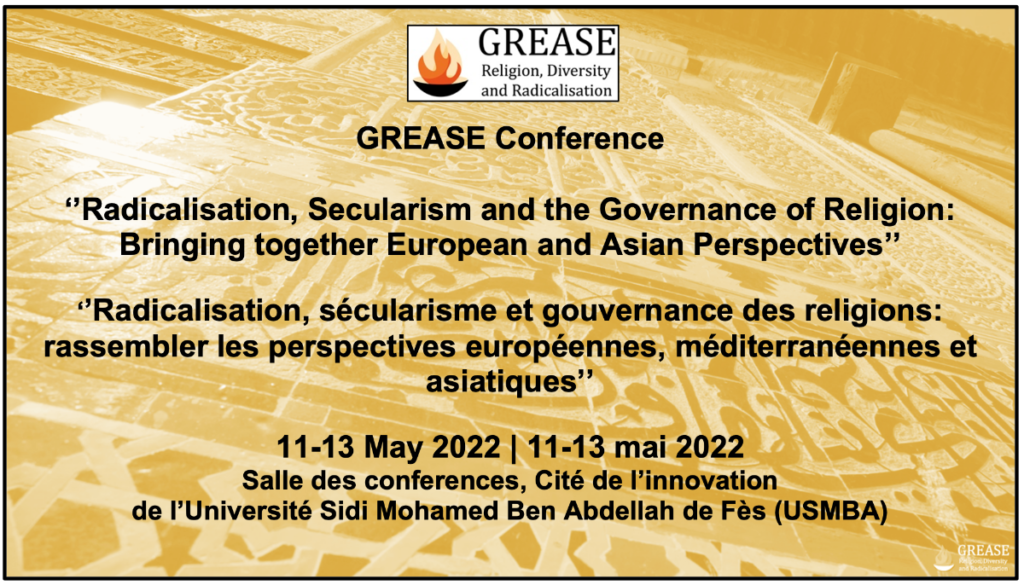
As pandemic restrictions are being lifted in many places, we are cautiously planning to hold two in-person events during the final months of our project.
Barring further restrictions on travel and assembly, we will host a two-day event in Fes, Morocco, next month (May 11-13). That will be followed a few months later (September 22-23) by our final conference in Brussels, Belgium.
In Morocco, invited participants will take part in a pair of policy roundtables and contribute to a MENA-focused academic workshop. Our final event in Brussels will feature a policy conference on the first day followed by an academic conference the next. We hope to live-stream at least some of the proceedings from our second day in Belgium. Both events will provide valuable opportunities to discuss our research findings and the recommendations put forth in our policy briefs.
GREASE newsletter subscribers will receive special notification about our final conference when the program is finalized.
Online Workshops
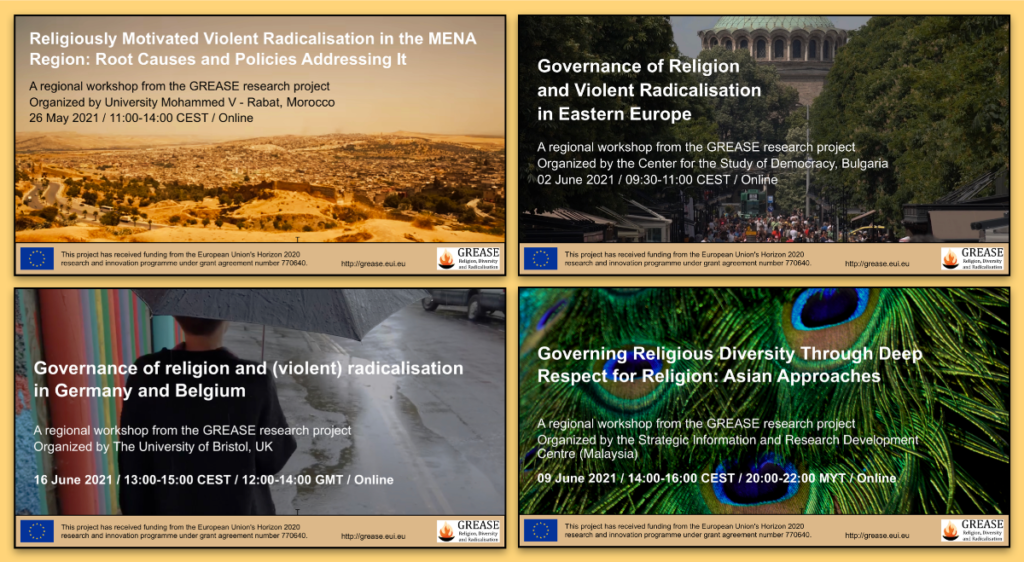
2021 Online Workshops
While pandemic restrictions were peaking in many places, the GREASE project held four on-line policy workshops. Originally planned as in-person events, the workshops covered four regions on three continents, bringing together diverse groups of scholars and stakeholders to discuss challenges related to religious diversity and violent radicalisation. These events provided important input for our policy briefs. Recordings of the workshops can be made available upon request. Full details are provided on the corresponding page of the GREASE website.
- Rabat, Morocco
Religiously Motivated Violent Radicalisation in the MENA Region: Root Causes and Policies Addressing It - Sofia, Bulgaria
Governance of Religion and Violent Radicalisation in Eastern Europe - Petaling Jaya, Malaysia
Governing Religious Diversity Through Deep Respect for Religion: Asian Approaches - London, UK
Governance of Religion and (Violent) Radicalisation in Germany and Belgium
Global Extremes Blog
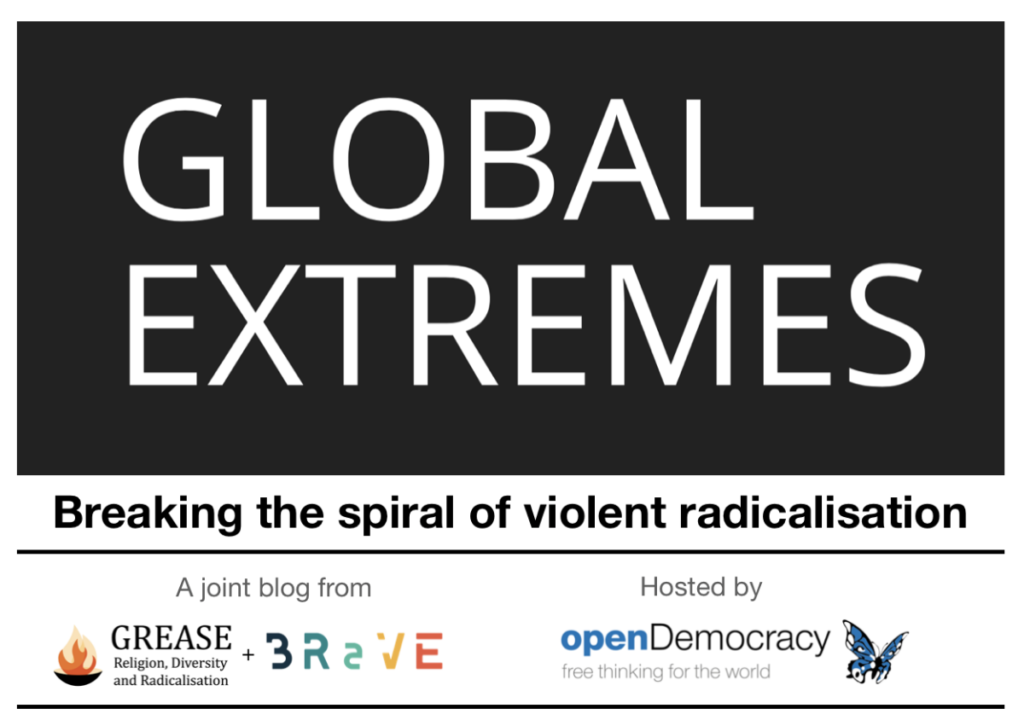
Our Global Extremes blog has grown considerably over the past year and continues to engage readers around the world. Many of the articles – which are published on the Open Democracy media platform – address topics directly related to our research. For your convenience, all contributions from GREASE project partners are featured here on our website. Over half the 64 articles published so far in the Global Extremes blog were written by members of our consortium.
Online Courses Continuing

For anyone who hasn’t yet taken advantage of our popular online courses, it’s not too late. We have scheduled additional runs for both. Here are the starting dates:
“Religion, Radicalisation, Resilience”
May 16th and October 24th, 2022
“Governing Religion: Global Challenges and Comparative Approaches”
September 5th, 2022, and February 6th, 2023
GREASE Film Featured in Festival
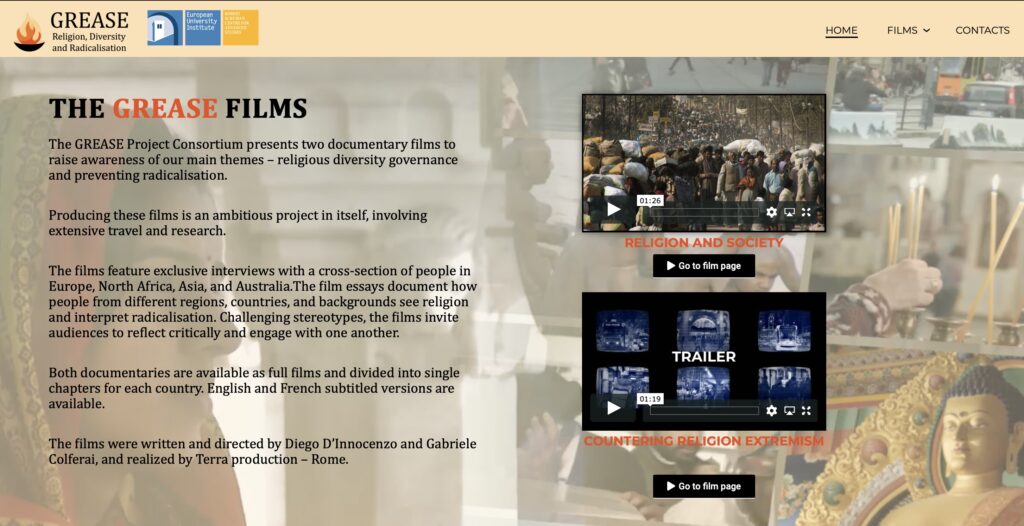
And finally, we are proud to report that our film Countering Religious Extremism was selected for inclusion in the EU-funded MAX Diversity Film Festival which took place in November.
This is one of two professionally produced films from the GREASE project, the other being Religion and Society: How Faith Fits in Around the World. Both are freely available on our website and YouTube channel.
